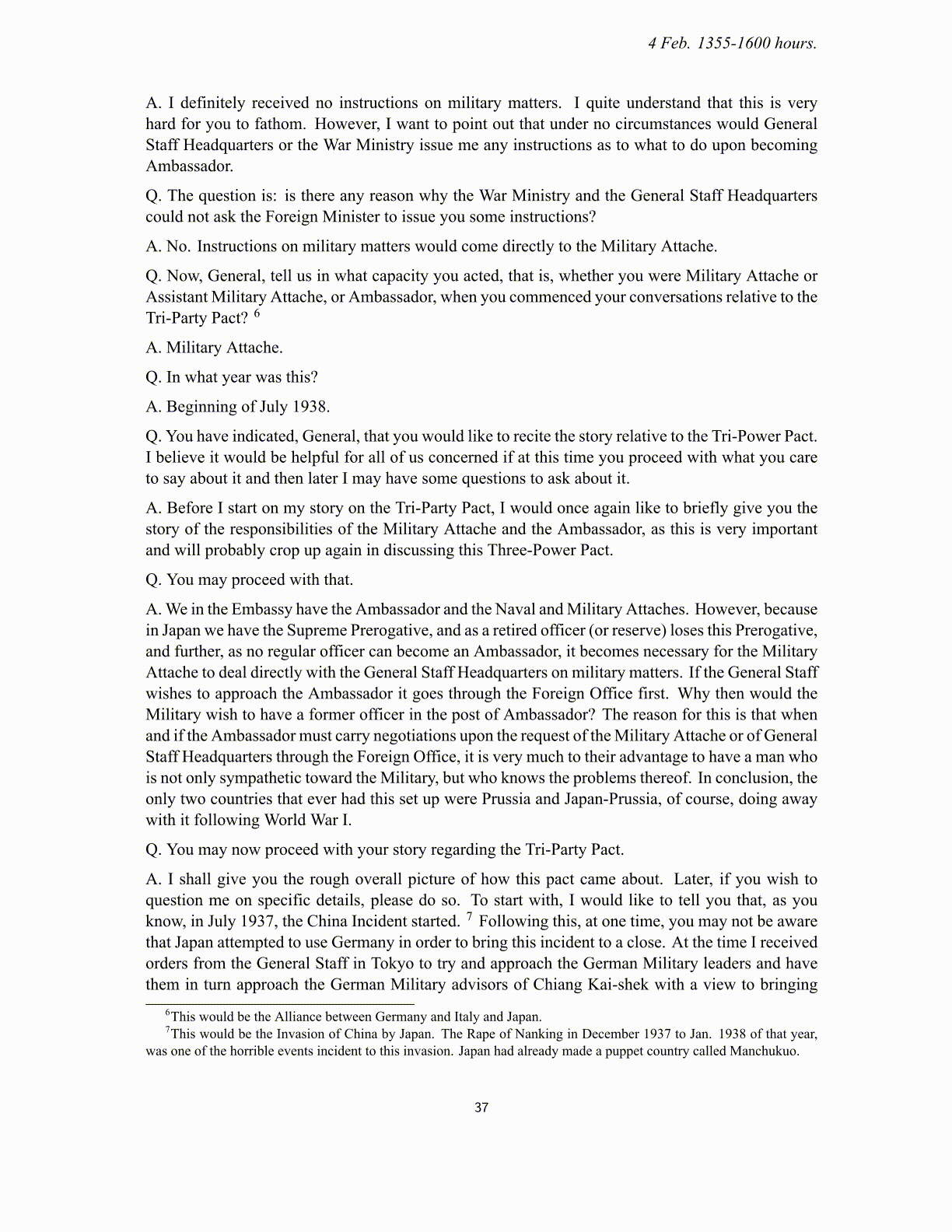
4 Feb. 1355-1600 hours. A. I definitely received no instructions on military matters. I quite understand that this is very hard for you to fathom. However, I want to point out that under no circumstances would General Staff Headquarters or the War Ministry issue me any instructions as to what to do upon becoming Ambassador. Q. The question is: is there any reason why the War Ministry and the General Staff Headquarters could not ask the Foreign Minister to issue you some instructions? A. No. Instructions on military matters would come directly to the Military Attache. Q. Now, General, tell us in what capacity you acted, that is, whether you were Military Attache or Assistant Military Attache, or Ambassador, when you commenced your conversations relative to the Tri-Party Pact? 6 A. Military Attache. Q. In what year was this? A. Beginning of July 1938. Q. You have indicated, General, that you would like to recite the story relative to the Tri-Power Pact. I believe it would be helpful for all of us concerned if at this time you proceed with what you care to say about it and then later I may have some questions to ask about it. A. Before I start on my story on the Tri-Party Pact, I would once again like to briefly give you the story of the responsibilities of the Military Attache and the Ambassador, as this is very important and will probably crop up again in discussing this Three-Power Pact. Q. You may proceed with that. A. We in the Embassy have the Ambassador and the Naval and Military Attaches. However, because in Japan we have the Supreme Prerogative, and as a retired officer (or reserve) loses this Prerogative, and further, as no regular officer can become an Ambassador, it becomes necessary for the Military Attache to deal directly with the General Staff Headquarters on military matters. If the General Staff wishes to approach the Ambassador it goes through the Foreign Office first. Why then would the Military wish to have a former officer in the post of Ambassador? The reason for this is that when and if the Ambassador must carry negotiations upon the request of the Military Attache or of General Staff Headquarters through the Foreign Office, it is very much to their advantage to have a man who is not only sympathetic toward the Military, but who knows the problems thereof. In conclusion, the only two countries that ever had this set up were Prussia and Japan-Prussia, of course, doing away with it following World War I. Q. You may now proceed with your story regarding the Tri-Party Pact. A. I shall give you the rough overall picture of how this pact came about. Later, if you wish to question me on specific details, please do so. To start with, I would like to tell you that, as you know, in July 1937, the China Incident started. 7 Following this, at one time, you may not be aware that Japan attempted to use Germany in order to bring this incident to a close. At the time I received orders from the General Staff in Tokyo to try and approach the German Military leaders and have them in turn approach the German Military advisors of Chiang Kai-shek with a view to bringing 6 This would be the Alliance between Germany and Italy and Japan. 7 This would be the Invasion of China by Japan. The Rape of Nanking in December 1937 to Jan. 1938 of that year, was one of the horrible events incident to this invasion. Japan had already made a puppet country called Manchukuo. 37